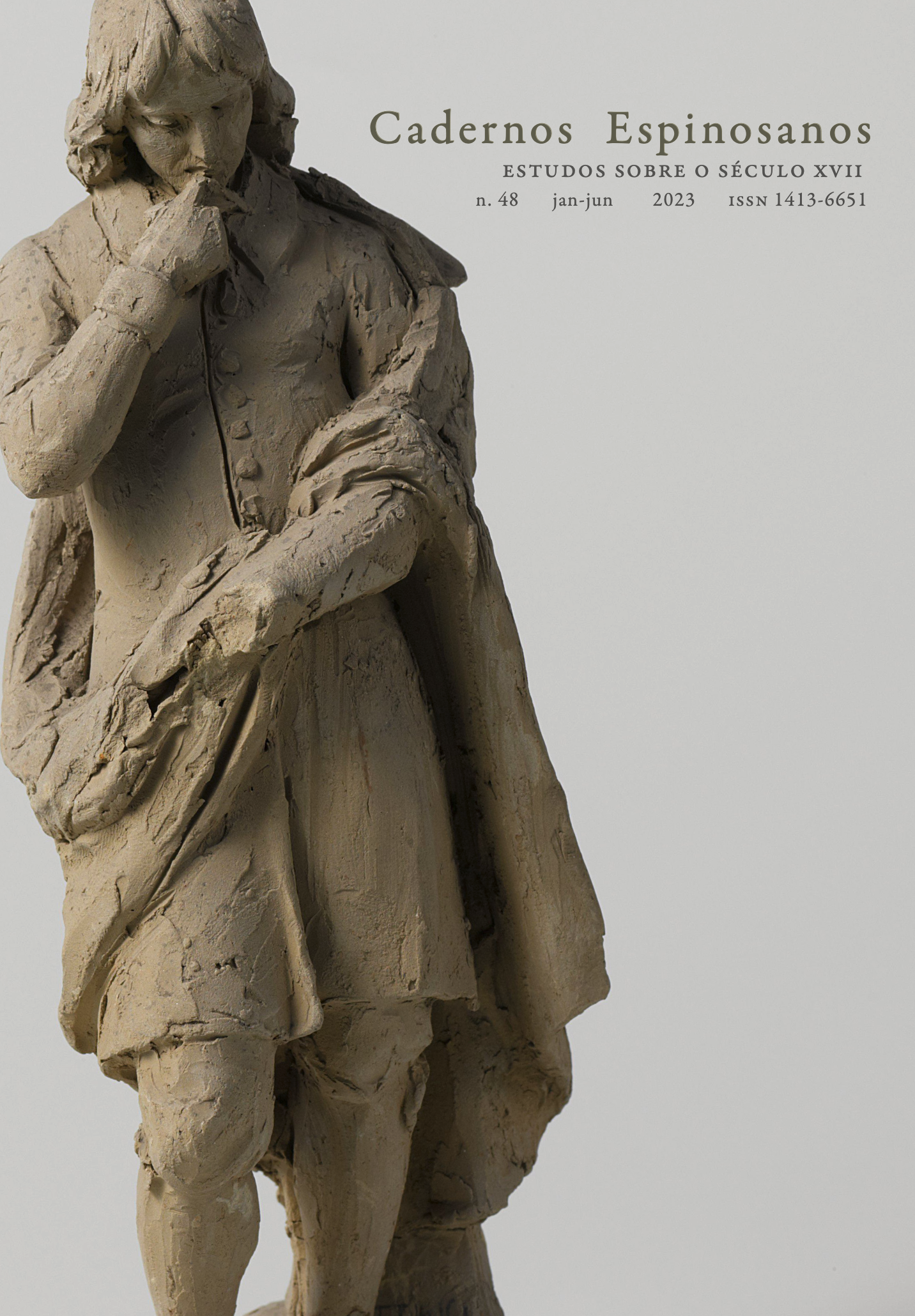ESSÊNCIA E EXISTÊNCIA: DUAS ORDENS DE CAUSALIDADE, DEDUÇÃO DOS MODOS FINITOS E A LIBERDADE EM ESPINOSA
DOI:
https://doi.org/10.11606/issn.2447-9012.espinosa.2023.202734Palavras-chave:
Essência, Existência, Causalidade, Determinação, LiberdadeResumo
O presente artigo tem por meta analisar a possibilidade de conciliação entre a determinação e a liberdade em Espinosa. Dessa maneira, o artigo iniciará tratando das duas séries causais indicadas por Espinosa no §100 do TIE: a “série das coisas fixas e eternas” e a “série das coisas singulares mutáveis”. A abordagem dessas duas séries causais tem por meta compreender o que as distingue e as implicações dessa distinção para a filosofia de Espinosa. Em seguida analisar-se-ão as noções de essência objetiva e essência formal evidenciando que o que está em jogo em EIIP7 é a adequação entre essas duas essências, e não uma adequação entre a essência e a existência. Nesse momento também será evidenciado que o tipo de causalidade que está em jogo em EIIP7 e EIIP8 é uma causalidade imanente, do tipo todo-parte, a qual se faz entre o conjunto e seus subconjuntos: ser parte é ser um subconjunto de Deus. Feito isso, mostrar-se-á que no âmbito da existência dos subconjuntos — e não no âmbito de sua essência — é possível autonomia relativa interpares, desde que essa autonomia seja concebida como subordinada aos conjuntos anteriores. Nesse momento também será evidenciado em que medida os modos finitos podem ser deduzidos da substância infinita sem que isso implique a negação de sua liberdade.
Downloads
Referências
CURLEY, Edwin; WALSKI, Gregory. 1999. Spinoza’s Necessitarianism Reconsidered. In: DELEUZE, Gilles. 1968. Spinoza et le problème de l’expression. Paris: Les Editions de Minuit.
ESPINOSA, Baruch. 2004. Tratado da reforma da inteligência. São Paulo: Martins Fontes.
ESPINOSA, Baruch. 2008. Tratado Teológico-Político. São Paulo: Martins Fontes.
ESPINOSA, Baruch. 2009. Ética. Belo Horizonte: Editora Autêntica.
ESPINOSA, Baruch. 2012. Breve Tratado de Deus, do homem e de seu bem estar. São Paulo: Autêntica.
ESPINOSA, Baruch. 2015. Princípios da filosofia cartesiana e Pensamentos metafísicos. Belo Horizonte: Autêntica Editora.
FERREIRA, Giorgio. 2018. Matéria e movimento em Espinosa: o que pode um corpo e algumas questões para a contemporaneidade. In: Modernos & Contemporâneos, Campinas, v.2, n.4, p. 147-167, jul./dez.
FERREIRA, Giorgio. 2021. Infinito e número na filosofia de Espinosa. In: Kriterion, Belo Horizonte, nº 149, p. 365-386, Ago.
GARRET, Don. 1991. Spinoza’s Necessitarianism. In: YOVEL, Yirmiahu (ed.). God and Nature in Spinoza’s Metaphysics. Leiden: Brill, p. 191-218.
GEBHARDT, Carl. (ed.). 1925. Spinoza Opera. Im Auftrag der Heidelberger Akademie der Wissenchaften herausgegeben von Carl Gebhardt. Heidelberg: Carl Winter. (4 vols.)
GUINSBURG, Jacob; CUNHA, Newton; ROMANO, Roberto (org.). 2014. Spinoza: Obra completa. São Paulo: Perspectiva. (4 vols.)
GLEIZER, Marcos. 1999. Verdade e certeza em Espinosa. Porta Alegre: L&PM.
REZENDE, Cristiano. 2004. Os perigos da razão segundo Espinosa: a inadequação do terceiro modo de perceber no Tratado da emenda do intelecto. In: Cad. Hist. Fil. Ci., Campinas, série 3, v. 14, n. 1, p. 59-118, jan-jun.
REZENDE, Cristiano. 2012. A ira, o trovão e o círculo: aspectos aristotélicos da definição explicativa da essência no De Emendatione de Espinosa. In: Analytica, Rio de Janeiro, vol 16 nº 1 e 2, p. 85-118.
Downloads
Publicado
Edição
Seção
Licença
Copyright (c) 2023 Giorgio Ferreira

Este trabalho está licenciado sob uma licença Creative Commons Attribution-NonCommercial-ShareAlike 4.0 International License.
Autores que publicam nesta revista concordam com os seguintes termos:
- Autores mantém os direitos autorais e concedem à revista o direito de primeira publicação, com o trabalho simultaneamente licenciado sob a Licença Creative Commons Attribution que permite o compartilhamento do trabalho com reconhecimento da autoria e publicação inicial nesta revista.
- Autores têm autorização para assumir contratos adicionais separadamente, para distribuição não-exclusiva da versão do trabalho publicada nesta revista (ex.: publicar em repositório institucional ou como capítulo de livro), com reconhecimento de autoria e publicação inicial nesta revista.
Authors who publish in this journal agree to the following terms:
b. Authors are authorized to take on additional contracts separately, to non-exclusive distribution of the article published in this journal (ex.: to publish in institutional repository or as part of a book), with an acknowledgment of its initial publication in this journal.


